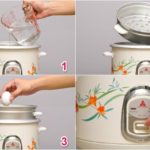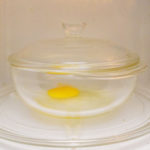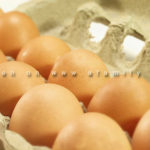Eggs can crack before or during boiling due to collisions with each other and the pot, causing the egg white to ooze out, affecting aesthetics, taste, and nutrition.
Tips for Boiling Cracked Eggs Without the Whites Leaking Out
Boiling eggs is not difficult, but to avoid the above situation, you can apply some tricks to boil cracked eggs while keeping the whites intact, as suggested below.
Use Vinegar
Vinegar is acidic, which helps alter protein structures, limiting their free movement and causing the egg whites to quickly reshape and not leak out. Adding a little vinegar to the boiling water also prevents discoloration due to oxidation, keeping the whites and yolks beautifully colored. Note that you should not use too much vinegar as it can overpower the taste and smell of the eggs.
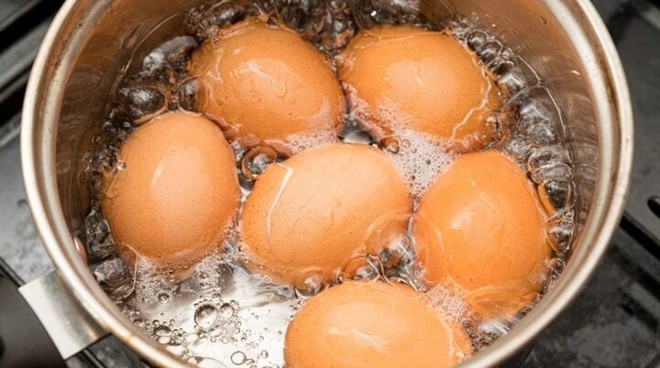
This trick requires carefulness and wisdom. (Photo: Cookist)
Use Salt
Salt has hygroscopic properties, helping to draw out some of the water in the eggs and quickly coagulate the proteins. Adding a little salt to the pot is an effective trick to prevent the whites from leaking out of cracked eggs. Salt also raises the boiling point of the water, causing the proteins to quickly coagulate and plug the cracks in the shell.
Salt also helps prevent and kill Salmonella bacteria, ensuring your safety when eating boiled eggs, especially soft-boiled ones.
Use Baking Soda
Baking soda, with the chemical formula NaHCO3, is a basic substance with a pH of 9. When added to the egg-boiling water, the high pH environment makes it easier for the egg white proteins to coagulate and prevents them from spilling out. At the same time, the higher pH reduces the adhesion of the egg whites to the shell membrane, making peeling easier. The appropriate dosage is about 1/2 teaspoon of baking soda per liter of water.
Heat the Water Before Adding the Eggs
One trick to prevent the whites from leaking out of cracked eggs is to heat the water to a gentle boil before adding the eggs. This way, the eggs will be exposed to a consistently high temperature, reducing the risk of cracking and the whites oozing out.
Boil the Eggs Over Medium Heat
When boiling eggs, simmer the water over medium heat to avoid vigorous boiling. High heat can cause the eggs to collide and crack. This helps the boiled eggs retain their shape and prevents the whites from spilling out.
How to Prevent Eggs From Cracking When Boiling
To reduce the risk of eggs cracking during boiling, you can apply the following tricks:
Use a Cloth
Place a clean cloth or a layer of paper towel at the bottom of the pot before adding the eggs. This will cushion the eggs and reduce direct impact with the pot, minimizing the chances of cracking. This method helps maintain the eggs’ shape and prevents the whites from leaking out.
Use a Pot of Appropriate Size
Choose a pot that is the right size for the number of eggs you want to boil. A pot that is too large or too small can cause the eggs to collide with each other or the sides of the pot, leading to cracking. Using a pot of appropriate size ensures even cooking.
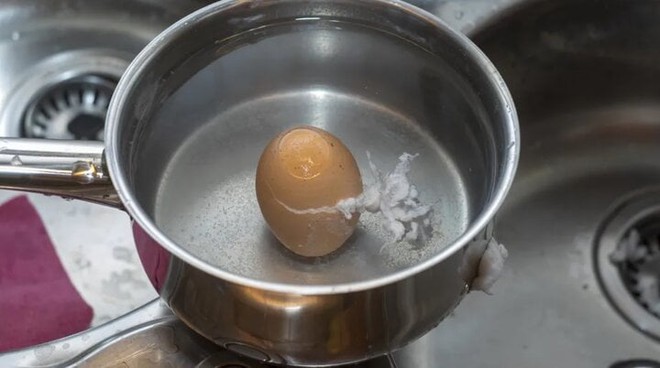
(Photo: Getty)
Soak the Eggs in Cold Water Immediately After Boiling
As soon as the eggs are cooked, remove them from the hot water and place them in a bowl of cold water. This stops the cooking process and makes the eggs easier to peel, while also preventing further cracking due to sudden temperature changes. This helps retain the eggs’ fresh taste and attractive shape.
Choose Fresh Eggs
Fresh eggs have stronger shells and are less likely to crack when boiled. Opt for fresh eggs to ensure a smoother boiling process. Fresh eggs not only taste better but also maintain their shape during boiling.
Choose eggs with smooth, uncracked, and spotless shells. Fresh egg shells usually have a uniform color and a slightly dull surface.
Bring Eggs to Room Temperature Before Boiling
If the eggs are straight from the refrigerator, let them sit at room temperature for about 15-20 minutes before boiling. This reduces thermal shock and minimizes the risk of cracking due to extreme temperature differences. Room-temperature eggs are easier to cook evenly and are less prone to having their whites spill out.
These tricks for boiling cracked eggs without the whites leaking out will boost your confidence in handling less-than-perfect eggs, ensuring the yolks and whites remain safely tucked inside. Give them a try!
























